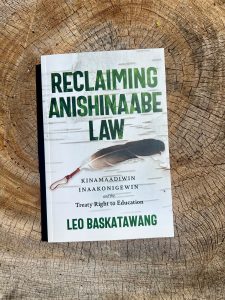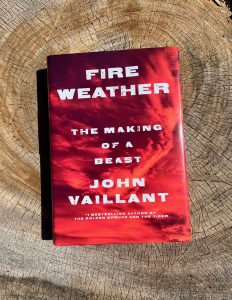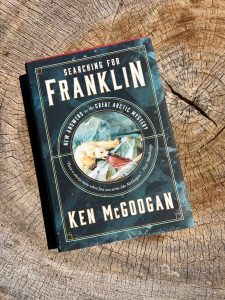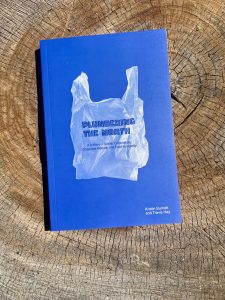There are five books on the 2024 J.W. Dafoe Book Prize shortlist and today we’re going to highlight Leo Baskatawang’s Reclaiming Anishinaabe Law: Kinamaadiwin Inaakonigewin and the Treaty Right to Education (University of Manitoba Press).
Here’s a Q&A with Leo Baskatawang.
What were your goals for this book?
 My primary goal for Reclaiming Anishinaabe Law was to write a book that would be beneficial to as many Indigenous communities in Canada as possible, but especially to my home nation, the Anishinaabe Nation in Treaty #3. With that being said, I tried to write the book in such a way that it would be of interest to all Canadians, whether they are Indigenous or not, so that they may learn how Canadian laws and education policies have been harmful to Indigenous communities, as well as to understand that Indigenous nations have their own laws related to education (that need to be recognized and affirmed by the Canadian government), which can serve to help establish their own education systems. I strongly believe that Indigenous education systems can improve educational outcomes of Indigenous youth, which would benefit all of Canada through the development of strong leaders of tomorrow’s generation.
My primary goal for Reclaiming Anishinaabe Law was to write a book that would be beneficial to as many Indigenous communities in Canada as possible, but especially to my home nation, the Anishinaabe Nation in Treaty #3. With that being said, I tried to write the book in such a way that it would be of interest to all Canadians, whether they are Indigenous or not, so that they may learn how Canadian laws and education policies have been harmful to Indigenous communities, as well as to understand that Indigenous nations have their own laws related to education (that need to be recognized and affirmed by the Canadian government), which can serve to help establish their own education systems. I strongly believe that Indigenous education systems can improve educational outcomes of Indigenous youth, which would benefit all of Canada through the development of strong leaders of tomorrow’s generation.
What have you learned about your process while working on this project? Or is every project unique….
While working on this writing project and seeing it through to its completion, the most important thing I learned about the process is that I am not doing it alone – it takes a community of hardworking, dedicated, and caring people to bring a book together. This community first includes my PhD committee (Drs. Peter Kulchyski, Frank Deer, and Aimée Craft) who read and provided recommendations on what was ultimately the first draft of my manuscript, as well as my external examiner (Dr. Bonita Lawrence). Upon making the recommended revisions to the first draft of the manuscript, I then submitted the revised version to the Acquisitions Editor (Ms. Jill McConkey) at the University of Manitoba Press, who then offered further suggestions for revision, which I happily adopted prior to the manuscript being sent to two blind reviewers. I then incorporated the feedback I received from the blind reviewers before the manuscript was given to the Managing Editor (Mr. Glenn Bergen) at the University of Manitoba Press, who also provided some helpful notes for my consideration. From there, the manuscript was passed on to a copy editor, who made more revisions to the manuscript, at which point an index for the book was compiled by yet another person. Most importantly though, none of this would have been possible without the love and support of Elder Fred Kelly, who kindly and very generously shared his knowledge about Anishinaabe legal orders with me, which formed the foundation of the book.
What books were important to you while you were writing this book? Who/what are your influences?
The book I was most inspired by, and tried to model my book after was Red Skin, White Masks by Glen Coulthard. It is one of the few books I have read multiple times, mainly because of its extraordinary contribution to critical political theory, particularly as it relates to the experiences of Indigenous peoples of Canada. His call for place-based education within Indigenous communities was, without doubt, extremely influential in the writing of my book. With that said, I consider John Borrows to be the most important Indigenous scholar in Canada with regard to his knowledge of Indigenous laws and analysis of Canadian case laws that pertain to Indigenous peoples. I am indebted to all the knowledge he has shared in his writings, and am also deeply inspired by his prolific writing ability and his dedication to social justice. It also makes me feel proud that Dr. Borrows and I are both of Anishinaabe heritage.
Tell me a bit about why you write about “Canada, Canadians and the nation in international affairs.” Why is it important to you?
I write about Canada, Canadians, and the nation in international affairs, first of all, because I am Canadian, and I am proud of that fact. With that being said, I endeavored to learn and write about the history of my people (the Anishinaabe Nation in Treaty #3) because I saw from first-hand experience that many of them were struggling, and I wanted to do something to help. During my educational journey, I learned about the processes of colonization and assimilation, and how many unjust laws were imposed against Indigenous peoples in Canada by way of the Indian Act, and that treaties promises were not maintained after they were negotiated. I also learned that Indigenous nations have always had their own laws prior to colonial contact, and became convinced that Indigenous laws need to be recognized and affirmed by the governments of Canada. Thus, in order to help spread that message, I decided to write a book about it, with the hope that it could support efforts towards the reconciliation of Indigenous nations and Canada. At the end of the day, I wholeheartedly agree with what the Honorable Justice Murray Sinclair once said, “education has gotten us into this mess, and education will get us out”.
What are you reading right now? What are you writing right now?
The book I am reading right now is Valley of the Birdtail by Andrew Stobo Sniderman and Douglas Sanderson. I picked up this book because I attended a presentation that the authors gave at my place of work, Robson Hall, which is in the Faculty of Law at the University of Manitoba. During the presentation, I learned that Valley of the Birdtail has many common themes and elements within it that are similar to what I wrote about in Reclaiming Anishinaabe Law. Moreover, I was intrigued to learn that the authors of Valley also employed a strategy of offering practical policy suggestions, similar to what I did in my book, as a way to convey hope and further the process of reconciliation between Indigenous peoples and Canada.
My next writing project will be a historical fiction narrative about the point of colonial contact between the Anishinaabe and the French in the early seventeenth century. As a work of historical fiction, it will be a significant departure from how I wrote Reclaiming Anishinaabe Law. My hope is that by telling this story, from an Anishinaabe perspective, that I can demonstrate to youth that Indigenous peoples lived in organized societies, governed by their own laws prior to colonial contact. My goal is to write the book in such a way that it is both educational and entertaining so that it appeals to a wide audience.
The winner of the J.W. Dafoe Book Prize, now valued at $12,000, will be named June 10.


 To engage Canadians in their own history, and to connect that history to our petroleum-powered — i.e., fire-powered — civilization and, from there, to the increasing flammability of our country, and our planet.
To engage Canadians in their own history, and to connect that history to our petroleum-powered — i.e., fire-powered — civilization and, from there, to the increasing flammability of our country, and our planet.

